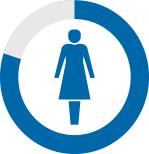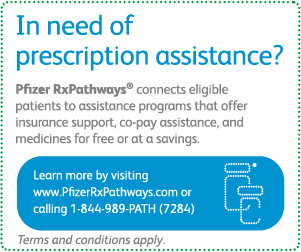
Up to 80% of postmenopausal women experience hot flashes.
In a separate survey, 1 out of 2 postmenopausal women experiencing hot flashes reported they were moderate to severe.
Hot flashes may range from mild, to moderate, to severe. While mild hot flashes only make you feel hot, moderate hot flashes also make you sweat. Hot flashes that make you sweat and stop what you are doing may be considered severe.
In fact, some women may suffer more than 20 hot flashes a day. For most women, hot flashes can last from 6 months to 2 years, but for some they may last years longer.
You may not have to settle for sweating and suffering through daily moderate to severe hot flashes due to menopause. Keep track of your symptoms and ask your doctor if Premarin may be right for you.
ASSESSING YOUR SYMPTOMS
HOT FLASH RELIEF MAY START WITH
TALKING TO YOUR DOCTOR

Get ready to make the most of your visit.
When it comes to dealing with your hot flashes, it might be time to make a change. Tracking your menopausal symptoms can help you talk to your doctor about getting relief.
Need help getting started?
Our Hot Flash Discussion Starter can help you track your hot flashes.
This is not a diagnostic tool. Your answers to these questions can help in a discussion with your doctor about your symptoms and whether a treatment might be right for you.
MORE ABOUT MENOPAUSE
SOME HELPFUL FACTS ABOUT MENOPAUSE
Menopause is a natural stage of a woman's life, during which the body undergoes many changes. Estrogen hormones are produced by your ovaries. By the time you reach menopause, estrogen hormones have been working hard for many years to support you through various stages of womanhood. As you transition to menopause, your cycle gets irregular and then stops. The level of estrogen in your body declines dramatically—and that's believed to contribute to hot flashes. Beginning at different times for different women, menopause typically starts between the ages of 40 and 58.
Menopause can also be reached surgically. Surgical menopause begins immediately after removal of the ovaries (either through a total hysterectomy and/or bilateral oophorectomy). The resulting estrogen loss can result in physical symptoms like moderate to severe hot flashes. Some women who have undergone surgical menopause experience these symptoms more severely than women who have gone through natural menopause.
Ask your doctor if you have questions about menopause or if you need more information about menopause.
Menopause occurs in 3 stages
The body usually moves through these stages gradually, except in the case of surgical menopause, which is immediate. To learn more about each stage of menopause, click on the image below.
-
PERIMENOPAUSE
When estrogen production from the ovaries starts to fluctuate and drop. Typically affecting women in their 40s, periods become less predictable and less frequent. Perimenopause can last for an average of 4 years, but for some women may last only a few months.
It is important to talk to your doctor about the effects these changes may have on your body.
-
MENOPAUSE
Occurs when your doctor has confirmed it and when you have not had your period for 12 straight months. The average age at which women reach menopause is 51. Estrogen levels continue to drop, which may cause natural changes in your body, like hot flashes.
It is important to talk to your doctor about the effects these changes may have on your body.
-
POSTMENOPAUSE
Typically starts for women in their 50s. Hot flashes can persist, continuing for some women into their 60s and 70s.
It is important to talk to your doctor about the effects these changes may have on your body.
This is not a diagnostic tool. Your answers to these questions can help in a discussion with your doctor about your symptoms and whether a treatment might be right for you.
START SAVING TODAY

YOU MAY BE ABLE TO SAVE WITH PREMARIN*
Premarin treats moderate to severe hot flashes due to menopause. Activate the Premarin Savings Card today.
*Terms and Conditions apply. This Card is not health insurance. This Card is only accepted at participating pharmacies. No membership fees are associated with this Card. Eligible patients will pay as little as $30 with a savings of up to $55 per prescription filled. Limit 12 offers per calendar year. Maximum savings of $660 per calendar year. If you are enrolled in a state or federally funded prescription insurance program, you may not use the savings card even if you elect to be processed as an uninsured (cash-paying) patient. Exp. 12/31/24. See below for full Terms and Conditions. For help processing, please call 1-855-477-7309. Pfizer: Attn: Premarin, 66 Hudson Boulevard East, New York, NY 10001-2192, www.pfizer.com.



